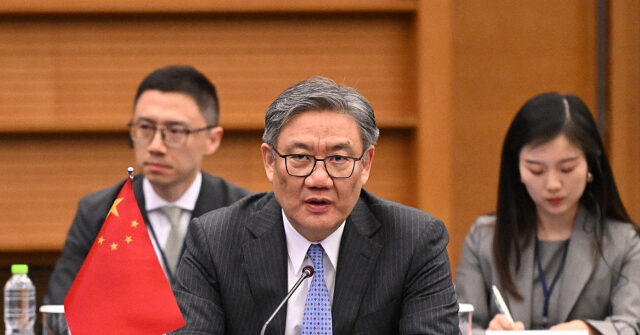A major finance newspaper in South Korea reported on Tuesday that, according to anonymous industry insiders, the Chinese Ministry of Commerce sent a letter to Korean companies threatening them against exporting goods using Chinese rare-earth minerals to the U.S. military.
South Korea has dramatically increased its profile as a manufacturer of defense technology and is similarly one of the world’s most prolific manufacturers of telecommunications and computer technology. These industries rely heavily on rare-earth minerals, a group of 17 elements common in the production of batteries, computers, automobiles, and other high technology. China dominates the rare-earth industry in both production and processing of the minerals and has recently used that leverage to reduce its exports in response to President Donald Trump’s efforts to limit the world’s dependence on the communist Chinese economy.
The Chinese government announced restrictions on exports of seven rare-earth minerals this month in response to the ongoing tariff war with America. The report in the Korea Economic Daily on Tuesday indicates that Beijing is not limiting its response to America but, rather, attempting to use its control of key industries to force third-party countries to promote Chinese interests. It also follows the publication of a statement by the Chinese Commerce Ministry on Monday that threatened to punish countries that negotiate business deals with the Trump White House.
The Korea Economic Daily cited “sources in the Korean transformer industry” and one unnamed source in the chaotic South Korean government stating that the Chinese Commerce Ministry directly reached out to unnamed companies that buy Chinese rare-earth minerals, warning them not to sell products containing those minerals to the U.S. military.
“According to sources in the Korean transformer industry on Tuesday, at least two of its transformer manufacturers have received official notices from China’s Ministry of Commerce,” the newspaper detailed, “demanding they cease exports of any power equipment containing Chinese-origin heavy rare earth metals to U.S. military contractors or the U.S. military.”
“A Korean government official said that China’s commerce ministry has sent the same letter to other local companies in the battery, display, electric vehicle, aerospace, and medical device sectors,” it added, “that solely rely on Chinese-origin rare earth metals imports.”
The letters reportedly did not identify any specific consequences for not heeding the warning aside from some form of sanction.
The report is consistent with the content of the Chinese Ministry of Commerce statement published on Monday, warning countries that “appeasement” of the United States “cannot bring peace, and compromise cannot be respected.”
“To seek so-called exemptions by damaging the interests of others for one’s own temporary selfish interests is to seek the skin of a tiger, which will ultimately only fail on both ends and harm others and oneself,” the statement read in part.
“China expects all parties to resolve their economic and trade differences with the United States through equal consultations,” it continued. “China believes that all parties should stand on the side of fairness and justice, on the side of historical correctness, and defend international economic and trade rules and the multilateral trading system on the issue of ‘reciprocal tariffs.’”
South Korea is a prolific buyer of Chinese rare-earth minerals. According to the Korea International Trade Association, nearly 50 percent of South Korea’s rare-earth minerals originated in China in 2024, a significant decrease from prior years but still a formidable percentage of the total. Around the world, China is responsible for over 90 percent of rare-earth processing, an onerous part of the production that separates rare-earth minerals out of mixed ground materials.
President Trump announced an increase in tariffs on nearly every country that conducts business with America on April 2, which he called “Liberation Day.” Shortly thereafter, the president announced that every country but China was open to renegotiating trade agreements to improve America’s position in them, so tariffs would be paused for 90 days — on every country except China.
The Chinese government responded to that announcement by limiting exports of seven rare-earth minerals. Beijing subsequently redirected pressure from Washington to other affected countries. Dictator Xi Jinping engaged in a tour of Southeast Asian countries last week, most prominently Vietnam and Cambodia, which initially faced tariffs up to nearly 50 percent from the White House. There, Xi lectured regional leaders on the alleged dangers of tariffs and trade policies intended to protect domestic industry.
The reported threats to South Korean business leaders appear to be timed to affect the arrival of a South Korean delegation in Washington to renegotiate the trade relationship with America. Finance Minister Choi Sang-mok departed from Seoul on Tuesday on a mission to meet with Treasury Secretary Scott Bessent and construct a new framework for American-Korean trade.
“I will return after opening the door for discussions on resolidifying the alliance between South Korea and the United States,” he told reporters before boarding the plane. The South Korean news agency Yonhap observed that South Korea is among the first countries to receive an audience with American leaders to renegotiate the trade relationship.
President Donald Trump is not personally expected to attend negotiations, but made a surprise appearance during talks between American and Japanese officials, shocking Prime Minister Ishiba Shigeru.
“I’ve never seen a [U.S.] president show up right from the start [of negotiations like that]. It was way beyond my expectations,” Ishiba remarked on Monday. “President Trump prioritizes the negotiations with Japan. A decision will be made through the president’s leadership.”
Follow Frances Martel on Facebook and Twitter.
Read the full article here


